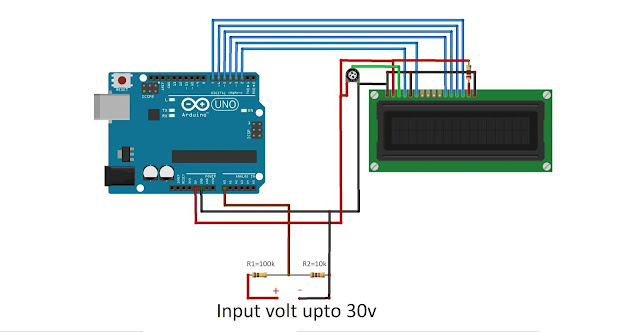metal detector using arduino
metal detector using Arduino
metal detector code, copy and pest
//*****" FUTURE TECHNOLOGY RC" (YOUTUBE CHANNEL) & my other channel is RC EXPERIMENTS HACKER*****
// Metal objects near search loop change inductance.
// ADC reading depends on inductance.
// changes wrt long-running mean are indicated by LEDs
// LED1 indicates a rise in inductance
// LED2 indicates fall in inductance
// the flash rate indicates how large the difference is
// wiring:
// 220Ohm resistor on D2
// 10-loop D=10cm seach loop between ground and resistor
// diode (-) on pin A0 and (+) on loop-resistor connection
// 10nF capacitor between A0 and ground
// LED1 in series with 220Ohm resistor on pin 8
// LED2 in series with 220Ohm resistor on pin 9
const byte npulse = 3;
const bool sound = true;
const bool debug = false;
const byte pin_pulse=A0;
const byte pin_cap =A1;
const byte pin_LED1 =12;
const byte pin_LED2 =11;
const byte pin_tone =10;
void setup() {
if (debug) Serial.begin(9600);
pinMode(pin_pulse, OUTPUT);
digitalWrite(pin_pulse, LOW);
pinMode(pin_cap, INPUT);
pinMode(pin_LED1, OUTPUT);
digitalWrite(pin_LED1, LOW);
pinMode(pin_LED2, OUTPUT);
digitalWrite(pin_LED2, LOW);
if(sound)pinMode(pin_tone, OUTPUT);
if(sound)digitalWrite(pin_tone, LOW);
}
const int nmeas=256; //measurements to take
long int sumsum=0; //running sum of 64 sums
long int skip=0; //number of skipped sums
long int diff=0; //difference between sum and avgsum
long int flash_period=0;//period (in ms)
long unsigned int prev_flash=0; //time stamp of previous flash
void loop() {
int minval=1023;
int maxval=0;
//perform measurement
long unsigned int sum=0;
for (int imeas=0; imeas<nmeas+2; imeas++){
//reset the capacitor
pinMode(pin_cap,OUTPUT);
digitalWrite(pin_cap,LOW);
delayMicroseconds(20);
pinMode(pin_cap,INPUT);
//apply pulses
for (int ipulse = 0; ipulse < npulse; ipulse++) {
digitalWrite(pin_pulse,HIGH); //takes 3.5 microseconds
delayMicroseconds(3);
digitalWrite(pin_pulse,LOW); //takes 3.5 microseconds
delayMicroseconds(3);
}
//read the charge on the capacitor
int val = analogRead(pin_cap); //takes 13x8=104 microseconds
minval = min(val,minval);
maxval = max(val,maxval);
sum+=val;
//determine if LEDs should be on or off
long unsigned int timestamp=millis();
byte ledstat=0;
if (timestamp<prev_flash+10){
if (diff>0)ledstat=1;
if (diff<0)ledstat=2;
}
if (timestamp>prev_flash+flash_period){
if (diff>0)ledstat=1;
if (diff<0)ledstat=2;
prev_flash=timestamp;
}
if (flash_period>1000)ledstat=0;
//switch the LEDs to this setting
if (ledstat==0){
digitalWrite(pin_LED1,LOW);
digitalWrite(pin_LED2,LOW);
if(sound)noTone(pin_tone);
}
if (ledstat==1){
digitalWrite(pin_LED1,HIGH);
digitalWrite(pin_LED2,LOW);
if(sound)tone(pin_tone,2000);
}
if (ledstat==2){
digitalWrite(pin_LED1,LOW);
digitalWrite(pin_LED2,HIGH);
if(sound)tone(pin_tone,500);
}
}
//subtract minimum and maximum value to remove spikes
sum-=minval; sum-=maxval;
//process
if (sumsum==0) sumsum=sum<<6; //set sumsum to expected value
long int avgsum=(sumsum+32)>>6;
diff=sum-avgsum;
if (abs(diff)<avgsum>>10){ //adjust for small changes
sumsum=sumsum+sum-avgsum;
skip=0;
} else {
skip++;
}
if (skip>64){ // break off in case of prolonged skipping
sumsum=sum<<6;
skip=0;
}
// one permille change = 2 ticks/s
if (diff==0) flash_period=1000000;
else flash_period=avgsum/(2*abs(diff));
if (debug){
Serial.print(nmeas);
Serial.print(" ");
Serial.print(minval);
Serial.print(" ");
Serial.print(maxval);
Serial.print(" ");
Serial.print(sum);
Serial.print(" ");
Serial.print(avgsum);
Serial.print(" ");
Serial.print(diff);
Serial.print(" ");
Serial.print(flash_period);
Serial.println();
}
}


Comments
Post a Comment